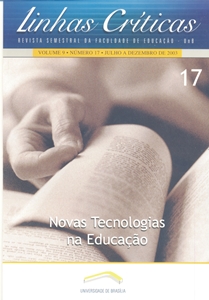A informática educativa aplicada à educação especial: o software educativo "Hércules e Jiló"
DOI:
https://doi.org/10.26512/lc.v9i17.3173Keywords:
Informática educativa;, Educação especial;, Deficiência mental;, Software educativo;, Recurso pedagógico;, Hércules e JilóAbstract
Trata-se de um ambiente de aprendizagem multimídia de caráter cooperativo, recomendado para alunos com necessidades educacionais especiais em nível de alfabetização por apresentarem deficiência mental. O software denominado "Hércules e Jiló" pretende estimular o aluno mediante múltiplos recursos, buscando a interação entre o virtual e o real, objetivando a alfabetização científica, matemática, lingüística, social e informática. Está baseado em cinco dimensões ”” de conteúdo, didática, cognitiva, lúdica e interativa ”” interdependentes e complementares, que se relacionam de maneira dialética. O mesmo foi concebido para servir de apoio pedagógico ao professor. Baseia-se em princípios cognitivo-construtivista.s e está centrado em uma série de atividades que se dividem em duas categorias: 1 ”” para montar e jogar; 2 ”” interativas e virtuais. As atividades abordam o tema dos seres vivos. Foi. Desenvolvido com profissionais de educação, psicologia, informática e desenho industrial. Foi objeto de tese de doutoramento realizada na UNED/Espanha.
Downloads
Downloads
Published
How to Cite
Issue
Section
License
Copyright (c) 2016 Linhas Críticas

This work is licensed under a Creative Commons Attribution 4.0 International License.
Authors who publish in this journal agree to the following terms:
-Authors maintains the copyright and grants the journal the right of first publication, the work being simultaneously licensed under the Creative Commons Attribution License which allows the sharing of the work with recognition of the authorship of the work and initial publication in this journal.
- Authors are authorized to enter into additional contracts separately, for non-exclusive distribution of the version of the work published in this journal (eg publish in institutional repository or as a book chapter), with acknowledgment of authorship and initial publication in this journal.
-Authorers are allowed and encouraged to publish and distribute their work online (eg in institutional repositories or on their personal page) at any point before or during the editorial process, as this can generate productive changes as well as increase the impact and the citation of published work (See The Effect of Free Access).



